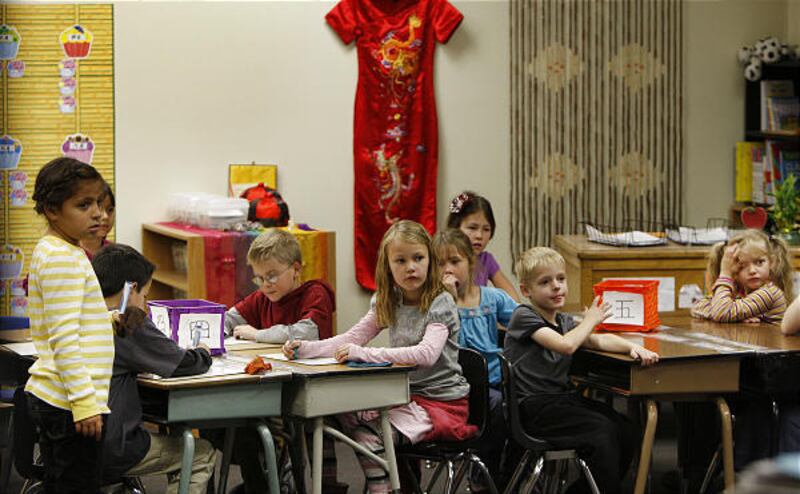OREM — Above a first-grade classroom door at Cascade Elementary hangs a sign. "No English."
The door is draped in a Chinese flag and Chinese symbols are scattered across the walls under shapes, numbers, pictures of animals and around the clock.
Just two months into school, Weixin Le's first-grade students understand and respond to her in Chinese.
The 50 kids in the Chinese immersion program at the school spend half their day learning math, social studies and science in Chinese and the other half learning language arts in English.
Last week, during their math portion of the class, the teacher wrote four addition and subtraction problems on the board. Speaking only in Mandarin, she asked them to answer one of the problems quietly to their neighbor. Giggling, the children whispered "shi" (pronounced like "sure"), which means 10. Then she asked them to say it loudly, and the children yelled out "shi."
That day, the principal, Doug Finch, sat at the teacher's desk near a red Chinese dress that hung on the wall and watched and learned with the children. He, too, responded in Mandarin.
The Chinese class, he said, wouldn't have come to his school this quickly had it not been for the Chinese Bridge Delegation Program (or Hanban trip), which he attended a few years ago, a program recently scrutinized by state auditors.
The Hanban trip is hosted by the Chinese government twice a year, and administrators and teachers from around the country travel to China to learn about the culture, the people and the advantages of Chinese immersion programs.
This is where Finch, who was then the Alpine curriculum director, said he was sold on the importance of the teaching young children Chinese. When he became principal, he decided to implement it.
But the state auditors office wrote in the October audit of school district travel that, "School districts should consider foregoing the trips until school budgets improve."
Since 2008, 159 Utah educators from 11 Utah school districts have gone to the week-long program, according to the audit. Utahns account for about 10 percent of the U.S. delegates. In 2009 alone, 762 delegates went from 40 states, about 19 delegates per state. Utah sent 83.
School districts pay a $900 registration fee per delegate for the summer conference and $450 per delegate for the winter conference. But two-thirds of the trip — round-trip international airfare, travel costs in China, lodging, group meals, tour guides and admission tickets — is paid for by Hanban, the Chinese government agency coordinating the program.
Auditors estimated that the total cost for Utah school districts for the trips in 2009 was about $90,000.
"It raised my eyebrows when I read about it," said Senate Minority Leader Pat Jones, D-Holladay, "especially in this economy. We are trying to scrape and claw the budget for money, and for many taxpayers, this looks like a junket. At face value, it looks frivolous to people."
But to people like Finch and Gregg Roberts, Utah State Office of Education World Language & Dual Immersion Specialist, the Hanban trip is anything but frivolous.
"I don't think they understand the significance of what is happening in Utah with early language programs," Roberts said. "This is one area where Utah is leading the nation, and I think it is unjust to punish the schools who send their educators to China because it just enriches the programs."
Roberts explained that Utah actually is sending less educators percentage-wise (at 10 percent) compared to the amount of Mandarin Chinese programs it has. Out of the 485 secondary schools in the nation that offer Mandarin, 95 are in Utah, or about 20 percent. And out of the 44 elementary schools that have the Chinese immersion program, 14 are in Utah, or 33 percent.
He also said that the audit incorrectly counted State Office of Education employees as costing the state money. He said the state employees that participated in the program last year personally paid the registration fee and all associated travel expenses, and took vacation time to participate.
"I was deeply disturbed by the gross inaccuracies and the negative portrayal of the China Bridge Delegation," Roberts said. "Everyone comes back with a greater understanding of the importance of early language education. Utah is a small state. For our economic survival and for the national security of our country, we must have students who are multi-lingual."
Not only did he call the conference the "most educationally rich conference/experience in which I have ever participated," he also said that Utah has benefitted more than 20 fold from participating in it and that each educator walks away from the conference with at least $1,000 worth of materials.
"There is no way that Utah would be recognized as one of the leaders in Mandarin Chinese instruction without the benefits of this extremely educational delegation," he said.
In July, Utah was awarded one of only two FLAP (Foreign Language Assistance Program) grants in the amount of $700,000 over the course of three years for Mandarin Chinese Dual Immersion Assessment, and Roberts said the reason institutions like this know about Utah's programs is because of the state's participation in the Hanban trip. The state also received over $140,000 from the National Security Agency to run summer Startalk camps for the Chinese Dual Immersion students.
This last summer, the principal of Lone Peak Elementary School, McKay Robinson, was asked to speak to the participants at the conference about establishing a Chinese immersion program. Lone Peak Elementary is in its second year of Chinese immersion and has 106 students on that track and more on waiting lists. He said at the conference, he got at least 50 business cards from educators in New York, Arizona, Washington and California, as well as from China.
Colleen Densley, principal at Wasatch Elementary, which has 175 student in the Chinese immersion program, the most in the state, went on the Hanban trip in June 2008 and said it made a difference in her view of the program.
"When you see what the country is like, you have a different kind of commitment to the language," she said
Next week two of her teachers will be participating in the conference and the district only had to pay to get them to the departure city. She said the children are picking up the tone and accent much faster and better than adults could. One of her teachers told her, "When I close my eyes during class, I hear a room full of Chinese children."
e-mail: slenz@desnews.com





